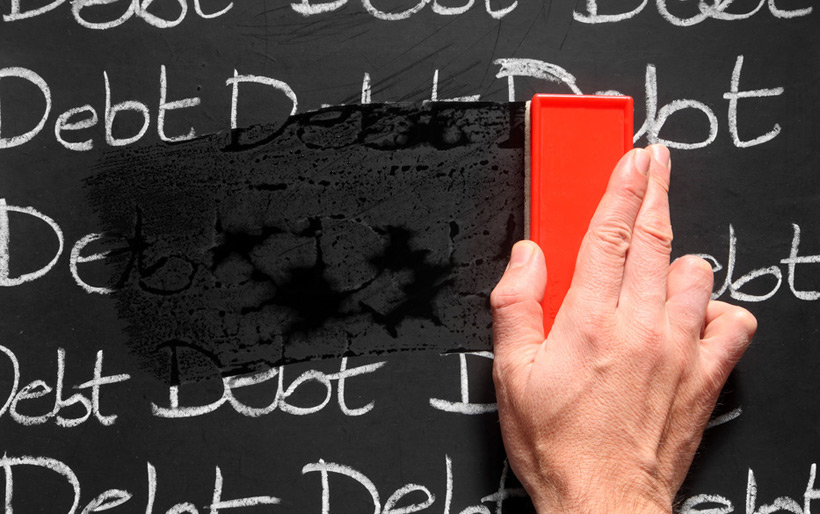Chapter 7
Get a Fresh Start: Keep your assets and eliminate your debt
In most cases, Chapter 7 bankruptcy can quickly eliminate your unsecured debt. Chapter 7 is designed to give a debtor overwhelmed by debt, a fresh start by “discharging” or completely eliminating their debt. In most Chapter 7 cases, the debtor has substantial credit card debt, medical bills, and other unsecured debt, and have very few assets. In the vast majority of cases, a Chapter 7 bankruptcy is able to completely eliminate all of these debts.

Once your case is filed, your creditors are “automatically stayed” from starting or continuing any collection action against you, meaning all harassing phone calls and correspondence you probably receive on a daily basis must stop immediately to afford you breathing space from your creditors.
Most people who file for Chapter 7 bankruptcy have the following kind of debt:
- Credit cards
- Medical bills
- Utility bills
- Personal loans
- Payday loans
- Debt owed on a car note from a repossessed vehicle
If you qualify to file for Chapter 7 bankruptcy, all of these unsecured debts can be completely wiped out in just a few months.
The following debts cannot be discharged in a Chapter 7 bankruptcy:
- Alimony
- Child Support
- Debts owed under a divorce or separation agreement
- Fraudulent debts
- Certain taxes
- Student Loans
Chapter 7 bankruptcy is a good fit for people who:
- Are struggling to make ends meet;
- Have mostly unsecured debt related to credit cards, medical bills, or personal loans; and
- Have few valuable possessions not protected by state or federal exemption laws.
Chapter 7 may not be for you if:
- You do not qualify because your income is too high, and after taking certain allowable deductions, you have enough disposable income to repay your debt; or
- You have valuable assets that are not protected under New York or Federal exemption laws; or
- You have received a discharge in Chapter 7 in the past 8 years, or received a discharge in Chapter 13 in the past 6 years.
Call us to see whether you qualify for Chapter 7, and if Chapter 7 is a good fit for you.
Chapter 13
Save your home from foreclosure and other assets from loss
You can use Chapter 13 to prevent a house foreclosure; make up missed car or mortgage payments; pay back taxes; stop interest from accruing on your tax debt; keep valuable non-exempt property that would be taken in a chapter 7 case, and more. If you can stick to the terms of your repayment agreement, all your remaining dischargeable debt will be eliminated at the end of the plan (typically three to five years).
One of the main contrasts between Chapter 7 bankruptcy and Chapter 13 bankruptcy is that Chapter 13 involves neither liquidation (sale) of assets nor quick completion. Intended to allow those who are struggling financially to maintain ownership of their property, particularly their homes, Chapter 13 filers develop a plan to catch up on their past due mortgage, car or tax payments, while staying current with these payments post-bankruptcy. A typical Chapter 13 bankruptcy repayment plan includes 36 to 60 months of payments during which debts are paid based on their priority. Secured creditors receive payment first, and remaining disposable income is used toward paying unsecured creditors. The hierarchy of payment has been established under federal law.
If all payments are made on time, any unpaid unsecured debt left over at the end of the plan can be discharged.
Not everyone qualifies for Chapter 13 bankruptcy. To be eligible and to have a successful case, you must:
- Have regular and steady income from which to make pre-established payments to a chapter 13 bankruptcy trustee under your repayment plan;
- Have adequate disposable income for these plan payments after covering necessary living expenses; and
- Not exceed debt limits established in the U.S. Bankruptcy Code.
If you do not qualify for Chapter 13 bankruptcy, you may still be eligible to file for Chapter 7 bankruptcy.
Many people find Chapter 13 bankruptcy beneficial in the following situations:
- They’ve fallen behind on payments for secured property they want to keep. Many Chapter 13 bankruptcy petitions are filed specifically to stop vehicle repossession or foreclosure, but Chapter 13 can also be used to catch up on secured debts while keeping the property that secures those debts.
- They’re facing tax debts that are non-dischargeable through Chapter 7 bankruptcy. Some tax debts cannot be discharged, but can be included in a Chapter 13 repayment plan to be paid off over time.
- They have non-exempt property they wish to keep. Non-exempt property can be sold (liquidated) to benefit creditors in Chapter 7 bankruptcy, but Chapter 13 allows debtors to maintain ownership of their property while making scheduled payments.
- They’ve already filed for Chapter 7 in the past eight years and so are ineligible to file under Chapter 7.
- They want to protect cosigners on some debts. In Chapter 7 bankruptcy filings, cosigners who do not file bankruptcy are still liable for debts even if that debt has been discharged to the primary debtor. In Chapter 13 repayment plans, though, cosigners are protected as long as the debtor adheres to the plan.
- They have overdue student loan debt. Student loans are only dischargeable in Chapter 7 bankruptcy in very rare cases, but they can be included in Chapter 13 repayment plans.
Call us to see whether you qualify for Chapter 13, and if Chapter 13 is a good fit for you.
Chapter 11
Operate your business while reorganizing its debts
Chapter 11 Bankruptcy primarily applies to commercial enterprises (although individuals can file as well) that wish to continue business operations while repaying creditors through a court-approved reorganization plan. A small business debtor must file a reorganization plan within 300 days of its bankruptcy filing, along with a disclosure statement that allows the creditors to evaluate the plan, although whether the plan is approved is ultimately the Court’s decision. The debtor has a number of options under Chapter 11 for returning the business to profitability. These options include reducing debts by repaying a portion of them while discharging others, rejecting burdensome contracts and leases, and rescaling operations of the business. Upon completion of the plan, the debtor usually has undergone a period of consolidation and emerges with a reduced debt load and a reorganized, and more profitable, business.
Call us if you operate a business to see whether Chapter 11 would be an appropriate course for reorganizing your business.
Foreclosure Defense
If you are facing foreclosure, you are probably feeling the pressure of trying to find a solution without wasting much time. In many cases, a lawyer is not hired and those that may have saved their homes lose them without a fight. It is not true that you cannot do anything about foreclosure. There is a very small window of time you have to make a decision. We can help you defend yourself from foreclosure in a variety of ways. Although it is not right for everyone, Chapter 13 bankruptcy allows some to keep their homes and pay off their debts in a reasonable manner. We strive to assist clients swiftly and effectively so that they can carry on with their lives without the stress of foreclosure looming over them.
Call us to see if we can help defend the foreclosure action against you.
Collection Defense
If you are sued and are served with a summons and complaint, you will have a specified time frame to file an answer or make a motion. An answer is a document that must be filed with the court that responds in writing to the allegations set forth in the complaint. It will have the same caption as the complaint and will be filed with the same court.
It is wise to seek the advice of an attorney before filing an answer. Some defenses such as Failure to State a Claim, Statute of Limitations, Lack of Personal Jurisiction should be raised in the answer or they may be deemed waived by the Court. Some of these defenses are provided under New York’s CPLR.
If you fail to answer the plaintiff’s complaint, they will file a motion for Entry of Default Judgment. If the judge approves the motion, a formal Default Judgment will be entered ordering you to pay damages. You will then be obligated to pay the judgment either voluntarily or through collection measures such as wage garnishment and property execution.
Call us to see if we can help defend the collection action against you.

